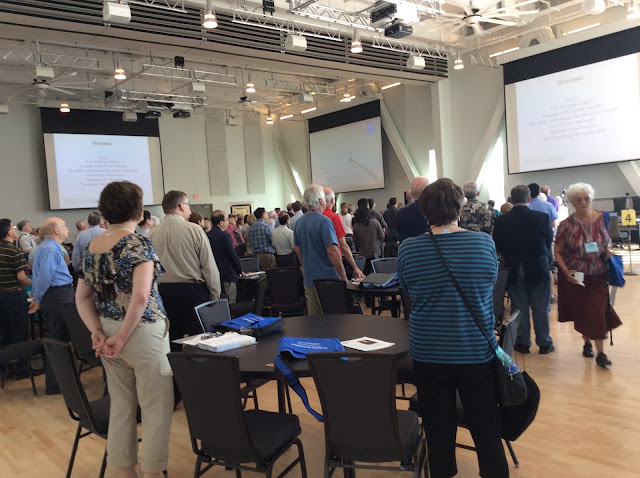In less than a week I will be hopping onto a plane headed for Vancouver British Columbia as a commissioner to the 2015 General Assembly of the Presbyterian Church in Canada.
One of the first things I decided when planning my travel was that I don't want to check any baggage. Anyone who has flown frequently knows how much a checked suitcase can tie you up upon arrival and I want to avoid that problem as much as possible. That means that I am going to have to fit everything I need for a week into a space that
21 in. x 9 in. x 15 in. plus a personal item. Can I do it?
I think I may have to make some tough decisions to make. I've already decided that I'm not going to take my laptop and I may have some withdrawal issues there! And, as much as I like to talk up my book, I'll probably only be able to bring a few copies. But what else might I have to leave behind? What will I just not be able to fit?
An Open Mind
As many will know, this General Assembly has received an unprecedented number of overtures that touch on LGBTQ issues. Normally, when these kinds of overtures are received, there isn't a lot of discussion to be had during the assembly because they are simply sent off to some committee or another to bring back a report to a future assembly. I was glad to see that this time that is not what is going to happen. There are plans to block out a substantial amount of time to discuss the issues and the impacts of change in table groups and in other ways. This process will be led, most ably I am certain, by the Moderator, Karen Horst.
I am glad that there will be a way in which I may speak my mind. I also recognize that I will be engaging with people who do not agree with me and I know those kinds of discussions can be hard. I will pray that the process goes well and that we can really listen to one another.
I recognize that no one can go into discussions like that with a mind that is completely open. Everyone will have limits to how much they are willing to accept or consider. There are certain things - certain attitudes and teachings - that I know I can't accept largely because of the harm that they do to marginalized people. (Too many gay, lesbian, transgendered young people have been deeply wounded and even pushed towards suicide by some traditional church teachings. We have to find a way to make that stop.)
So, as I eye my carry-on bag, I'm really wondering: how much of an open mind can I fit in that thing?
Scriptural Baggage
Nope, I don't have room to pack my Bible. The thing will just take too much space. But that is okay because I do have the Bible on my Ipad mini. Anything I read during the week, it will have to be from that. But it's not just about how much physical space my Bible takes up. I am also wondering how much space the Bible will take in our considerations.
There are basically six passage in the Bible that have anything to do with the LGBTQ discussions:
1) Genesis 19
2) Judges 19
3) 1 Timothy 1
4) Leviticus 18 / 20 (Both chapters say basically the same thing)
5) Romans 1
6) 1 Corinthians 6
As far as I can see, Genesis 19 and Judges 19 do not really apply to our discussions. They are accounts of attempted gang rape that is rightfully condemned. We're not talking about tolerating rape so they hardly apply. Since 1 Timothy is merely a reference to the immorally of what happens in Genesis 19, it also doesn't apply.
The Leviticus passages also don't really apply. They are part of a holiness code - intended to set the Hebrew people apart from their neighbours in primarily cultural ways. We regularly ignore many of the precepts of the holiness code and conclude they don't apply to us so there is no real reason to think that these teachings should apply to us.
That leaves the two brief passages that come to us from the Apostle Paul (no, I don't think that Paul wrote 1 Timothy, but that is another discussion). I tend to think that, what the apostle is rejecting in these passages is the sorts of same sex relations that he observed or heard about in his world - relationships that were not consensual and that generally reflected one person exercising power over another. We wouldn't want to affirm those kinds of relationships either.
Also, I think that Paul is clearly operating out of a very different understanding of the issue from the one that we must confront. We understand the issues in terms of sexual orientation and how people may best live out their lives with the orientation that is a given for them. This is a way of talking about these things that was completely foreign to any understanding in the ancient world. That means that we and Paul are not exactly talking about the same thing.
So I don't necessarily see these passages as a strong argument against change.
But... what if I am wrong. What if a deep examination of the passages, the original language, the full historical context demands that I conclude that Paul really intended for these passages to apply to our judgments in the modern world? Would that make me change my mind? I don't think so. I am not inclined to allow a couple of passages, even if their interpretation were crystal clear, overrule what I see as the central Gospel message of treating the outsider with respect - a message of acceptance and grace.
I have always viewed myself as a Christian who takes the Bible seriously (though not literally). I have always thought it better to grapple with the passages that make us feel uncomfortable than it is to take the passages that we like and turn them into platitudes that make us feel good. But how much of that Biblical approach am I willing to make room for in my little carry-on? That is a question I am asking myself.
What Actually Matters
I know that a lot of people are already thinking of the LGBTQ overtures as the big issue at General Assembly. I don't think that should be true. Given the paucity of passages on the subject, it is clearly not a major biblical obsession. The Bible devotes so much more attention to the issue of poverty within society then it does to this particular issue. I would love to see our discussion follow Biblical priorities. Imagine what we could accomplish by focusing half of the energy that we're devoting to this issue to poverty!
And there are also very pressing issues that are before the General Assembly and the church in general. There is a great need to revitalize our churches. We need to make sure that we have a national church structure that is genuinely supporting the work of the local congregation. We need to think very carefully about what we are investing assets (financial and otherwise) in in order to build a church for the future. These are the important issues for the church.
But, of course and unfortunately, whenever a national church meeting is talking about anything that has anything to do with sex, the topic very quickly seems to suck all of the oxygen out of the room and there doesn't seem to be enough left to allow our focus to be on anything else. (Our modern society, you see, is far more obsessed with sex than the Bible ever was.) So there is a real question whether I - whether all of us - will manage to fit in the time and attention to focus on what really matters on this trip. My biggest worry is that we won't.
Packing
So here I am packing and wondering how much biblical baggage, how much of an open mind and how much energy to focus on what really matters I'll be able to fit in my little carry on. At this point, I don't know what the answer is. I do intend to keep you up to date, though, and to blog about my experiences in Vancouver if you are interested in finding out how much I actually manage to cram into that little bag.
No matter what, I am certainly looking forward to it.









